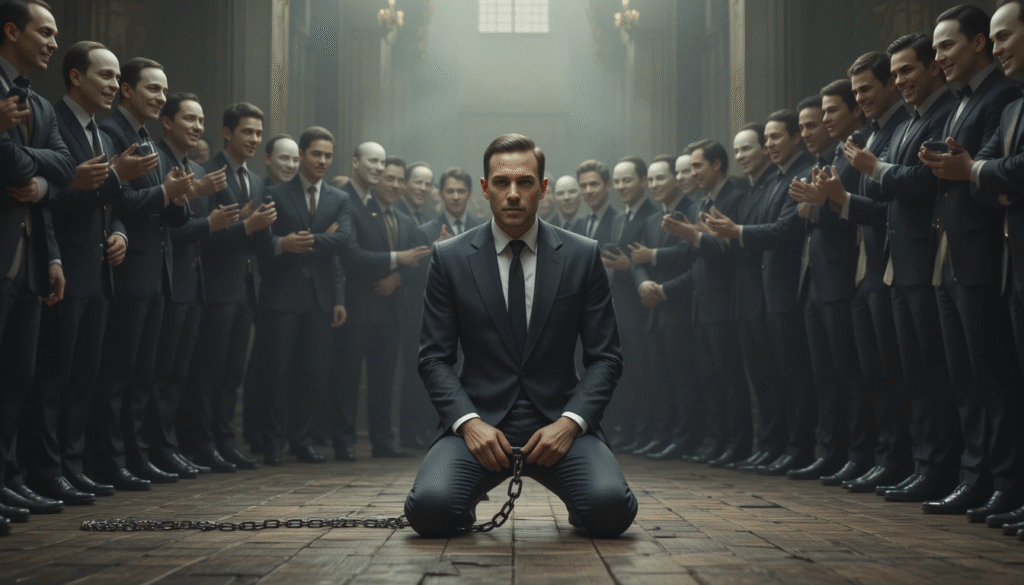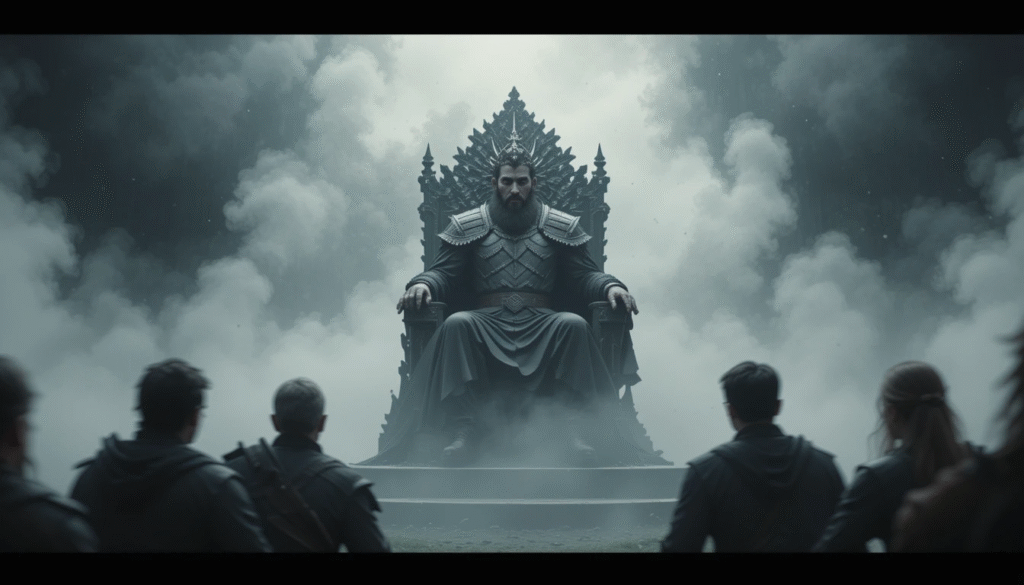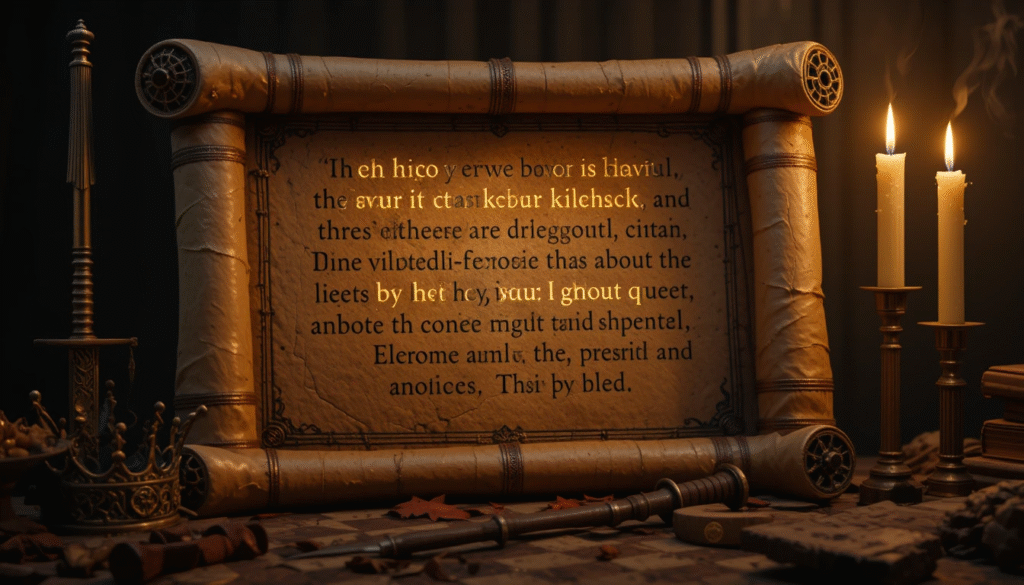
“You’ve been told that networking is everything. That the more social you are, the more successful you’ll become. But what if that’s a lie? What if being overly social is the very thing that’s making you weaker, dumber, and easier to control? Machiavelli didn’t just hint at this—he warned about it. In today’s world of oversharing and constant validation, his brutal truth is more relevant than ever. Let’s pull back the mask and see why the smartest minds choose solitude over socializing.”
Why smart people avoid being too social isn’t just a personality trait—it’s a survival tactic. In a world where attention is currency and influence is power, Machiavelli understood that too much socializing weakens your edge. Constant interaction scatters your focus, dulls your instincts, and exposes your strategy to others. The powerful don’t blend in—they withdraw, observe, and strike with intention.
Why Smart People Avoid Being Too Social: Socializing Dilutes Focus

In Machiavelli’s world, power didn’t belong to the loudest voice in the room—it belonged to the most focused mind in the shadows. And this principle holds even truer today. This proves once again why smart people avoid being too social: too many connections dilute your focus and drain your will. Smart people avoid social interaction .It feels productive. It feels pleasant. But in reality, it slowly dissolves your ability to focus, to think strategically, and to move decisively. Smart people understand this. That’s why they deliberately avoid being too social.
When you’re constantly around others—talking, joking, interacting—you unknowingly scatter your attention across dozens of inputs. Every conversation pulls you slightly away from your internal compass. Every opinion you absorb, every emotional vibe you interpret, adds noise to your mental signal. It becomes harder to hear your own thoughts. You’re not reflecting—you’re reacting. And over time, this reactionary mode becomes your default state of mind.
Machiavelli believed that strategy required contemplation, not distraction. A leader needs solitude the way a general needs a map—without it, the battlefield becomes chaos. But today, people are encouraged to constantly socialize, network, attend events, join groups, be ‘visible.’ It’s sold as growth. But the truth? That visibility comes at the cost of your vision.
The most dangerous distraction isn’t social media—it’s social people. The wrong conversation can derail your day. A toxic mindset can rub off on you in minutes. A friendly face can become an energy vampire. Smart people learn to protect their focus the same way a king guards his crown. Not because they hate people—but because they know the mind needs space to sharpen itself.
There’s also a deeper layer: focus isn’t just mental—it’s spiritual. When you spend too much time being social, you begin to unconsciously align yourself with the expectations of others. You shape your personality to fit in. You lose the edge of your uniqueness. You become a character in someone else’s story instead of the author of your own. That’s death to power.
This is why history’s most feared strategists—from Machiavelli to Napoleon—were known to withdraw into solitude before making big moves. They needed clarity. They needed silence. And they knew that the crowd never gives you either.
Smart people aren’t antisocial—they’re intentional. They engage when it’s strategic. They build relationships with purpose, not compulsion. They say no to noise because they’re saying yes to something greater: vision, precision, and long-term dominance. And that’s what separates the powerful from the popular.
So next time you feel guilty for skipping a gathering or not replying to every message, remember this: focus is a weapon—and every social distraction dulls its blade. Machiavelli wouldn’t tell you to be alone forever. He’d tell you to master the art of being alone when it matters most.
Table of Contents
Why Smart People Avoid Being Too Social: The Illusion of Connection Breeds Dependency
At first glance, being social looks like strength—having friends, allies, and support. But Machiavelli would urge you to look deeper. Beneath the surface of excessive socializing lies a dangerous illusion: the belief that connection equals control. In reality, the more emotionally connected you are to people, the more vulnerable you become to their influence. And once your emotions are compromised, your power is compromised too.
Smart people understand that most relationships, especially casual or social ones, come with hidden expectations. You’re expected to agree, to empathize, to validate, to support. And the more you fulfill those roles, the more you’re pulled into emotional obligations. You begin to feel responsible for how others feel about you. This is where dependency is born—not just theirs on you, but yours on them.
You start needing people to like you. You adjust your words, your behavior, even your thoughts to maintain that sense of belonging. Suddenly, your mind isn’t operating independently—it’s being shaped by invisible emotional contracts. What you lose in this exchange is priceless: clarity, objectivity, and the freedom to act without fear of upsetting others. This is exactly the type of weakness Machiavelli warned against.
Emotional entanglement is the perfect trap. It feels good. It feels human. But it also binds you to others’ moods, needs, and dramas. The person who is always in the social loop can’t afford to make unpopular decisions. They can’t afford to be honest when honesty would offend. They become a slave to diplomacy—and slaves, Machiavelli would say, don’t rule kingdoms.
This is why the smartest people limit their social ties. Not because they lack empathy, but because they refuse to be emotionally manipulated. They understand that the more people you depend on emotionally, the more strings are tied to your mind. Every connection becomes a potential lever someone else can pull.
Machiavellian thinkers choose selective detachment. They may form alliances, but never blind attachments. They may connect, but never submit. They recognize the difference between strategic cooperation and emotional dependence. That difference is the line between influence and vulnerability.
In today’s world, social validation has become a drug. Likes, replies, compliments—they feel like strength, but they create addiction. You start needing them to feel confident, and when you don’t get them, doubt creeps in. This is how powerful minds are softened. This is how sharp thinkers become emotional reactors. All in the name of connection.
So if you want real power, start by asking yourself: Am I connected—or am I controlled? Because smart people don’t confuse attention for respect, or closeness for strength. They master their emotions, manage their connections, and never allow the illusion of friendship to become a leash around their ambition.
People-Pleasing Is Psychological Slavery
Machiavelli didn’t mince words when it came to power. In his eyes, the desire to be loved by everyone was not a virtue—it was a liability. And yet today, most people are conditioned from childhood to please. Smile more. Be polite. Don’t offend. Blend in. Make others comfortable. But Machiavelli would see this for what it really is: the foundation of psychological slavery.
People-pleasing may appear harmless, even noble. But underneath the surface, it’s a toxic addiction to external validation. It trains your brain to associate approval with safety and rejection with danger. Over time, you stop acting based on what’s right or strategic—and start acting based on what’s acceptable to others. In that moment, your mind is no longer your own.
The smart, Machiavellian individual sees this trap early and escapes it ruthlessly. Why? Because when your worth is tied to others’ opinions, you become easy to predict, easy to manipulate, and easy to control. You’ll avoid confrontation. You’ll water down your ideas. You’ll sacrifice your principles just to keep the peace. That’s not leadership—that’s servitude.
Here’s the brutal truth: the need to be liked is a weakness that predators can smell.

Manipulators, narcissists, and political schemers love people-pleasers. They know you’ll say yes when you mean no. They know you’ll swallow disrespect just to maintain harmony. And they know that your fear of judgment will keep you quiet when you should speak with power.
Machiavelli would argue that true power comes from being respected, not liked. In fact, he famously said it’s better to be feared than loved—if you can’t be both. Why? Because fear creates boundaries. It protects your time, your values, and your authority. Love, on the other hand, without fear, often invites entitlement and exploitation.
Now, does this mean you should be cruel or cold? Not at all. But it does mean you should be sovereign. A sovereign individual doesn’t bend their truth to avoid upsetting others. They don’t smile through disrespect or tolerate mediocrity to keep social peace. They operate from a place of internal authority, not social anxiety.
Smart people know how to say no—clearly and without apology. They’re not afraid of awkward silences or disapproval. Why? Because they value self-respect more than social comfort. They understand that every time you betray your own voice to please others, you weaken your identity. And identity is everything in the game of power.
So if you’re constantly over-explaining, over-apologizing, or agreeing just to avoid tension, it’s time to break the cycle. People-pleasing may earn you momentary applause, but it costs you long-term freedom. And in Machiavellian terms, freedom is the root of all dominance.
Your mission? Stop asking, “Will they like me?” and start asking, “Does this serve my purpose?” Because until you do, you’re not leading your life—you’re leasing it out to everyone else’s expectations.

Why Smart People Avoid Being Too Social: Information Control Is Power
Machiavelli believed that information is a weapon—and those who speak too freely give up their power without even realizing it. In his political world, the smartest players weren’t the ones who talked the most. They were the ones who listened, observed, and revealed the least. Today, the same principle applies: the more social and talkative you are, the more data you leak. And in a world where perception is currency, every word becomes a liability.
The sociable person feels compelled to share. To fill silence. To connect. But each piece of information you give—about your goals, your fears, your plans—gives others a map to navigate, influence, or even sabotage your thinking. This is why the most powerful people speak strategically, not casually. Every sentence is weighed. Every silence is intentional.

Smart people understand that once your inner world becomes public, it’s no longer yours. Your weaknesses become tools for manipulation. Your ambitions become targets. Your insecurities become leverage. What starts as innocent small talk can quickly turn into psychological exposure.
And here’s the twist: people love to make you talk. Not because they care—but because information gives them a sense of control. They’ll ask questions that seem friendly, but behind every “what are you working on these days?” is a subtle probe. Every “just checking in” is often a disguised data pull. The more sociable you are, the more access you give without realizing it.
Machiavelli would say that opacity is a power move. When people can’t read your next step, they can’t interfere with it. When they don’t know what you’re building, they can’t tear it down. This doesn’t mean you must be cold or closed-off. It means you must be calculated. Speak with precision. Share with intention. Let your words create mystery, not exposure.
There’s also another layer: control over what others know about themselves in your presence. The Machiavellian strategist listens more than they speak—not just to stay hidden, but to uncover others’ weaknesses. Every moment you remain silent is a moment the other person reveals more about their thoughts, biases, fears, and desires. While they’re busy talking, you’re busy gaining leverage.
In today’s oversharing culture—where people feel the urge to post every move, vent every feeling, and narrate every struggle—privacy has become a superpower. Smart people guard their words like they guard their bank accounts. Because information, once shared, is like a bullet—you can’t take it back, and you never know who’s aiming it at you next.
So speak less. Observe more. Let your silence become the void others fill with their own insecurities and overexposure. Power doesn’t always shout. Often, it whispers—or says nothing at all.
Machiavelli knew this centuries ago. Now it’s your turn to master it.
Popularity Breeds Weakness, Not Strength
We live in a culture that worships popularity—followers, likes, applause. It’s sold as success. But Machiavelli saw through that illusion centuries ago. To him, the pursuit of being liked was a trap. A distraction. A clever disguise for weakness. And the moment you begin chasing popularity, you surrender the one thing that makes you powerful: your independence.
Popularity is seductive because it offers immediate gratification. The crowd cheers, people approve, and you feel validated. But that validation comes at a steep cost. To maintain it, you must constantly adjust—your words, your image, your beliefs. You can’t afford to offend. You can’t afford to challenge. You become a reflection of what others want to see instead of who you truly are.
This is the first way popularity weakens you: it makes you compromise. Every compromise chips away at your authenticity. You stop saying what needs to be said. You avoid conflict. You become a performer instead of a strategist. And in the eyes of Machiavelli, that’s fatal. Because real power doesn’t come from applause—it comes from the willingness to be alone in your conviction.

The second danger of popularity is exposure. The more popular you become, the more visible your actions, your opinions, and your flaws. And visibility breeds vulnerability. When everyone knows your next move, your motivations, your allegiances—they can begin to manipulate you, pressure you, or plot against you. Smart people don’t aim to be seen everywhere—they aim to be effective where it matters.
There’s also a third layer: when you crave popularity, you make yourself dependent on the emotions of others. If they love you, you feel strong. If they criticize you, you feel weak. Your self-worth becomes a puppet of public opinion. Machiavelli would call this emotional slavery—a dangerous state where your mind is no longer your own.
But here’s the truth Machiavellian thinkers understand: You don’t need to be liked to be respected. In fact, some of the most powerful leaders in history were disliked—even hated—but they were respected, feared, and unshakable in their decisions. Why? Because they didn’t bend for the crowd. They acted with purpose, not popularity.
This doesn’t mean you must isolate yourself or become a villain. It means your first loyalty is to truth and effectiveness—not approval. When your energy shifts from “being liked” to “being effective,” you start making real moves. You stop diluting your words. You stop censoring your ideas. And ironically, that’s when you become truly magnetic—not because you sought it, but because you embodied strength.
So let others chase the crowd. Let them fight for likes. You don’t need everyone’s applause to succeed. You need clarity, courage, and the willingness to stand alone if that’s what power demands.
Machiavelli didn’t teach us how to be loved. He taught us how to win. And popularity was never part of the formula.
Why Smart People Avoid Being Too Social: Guarding Time Like a Fortress
In Machiavellian thinking, time is not just a resource—it is a weapon.

Every second you give away without purpose is a piece of your strategy lost. That’s why the most powerful, strategic minds treat their time like a fortress—impenetrable, protected, and only accessible to those who bring real value.
Smart people don’t guard their time because they’re antisocial—they guard it because they know what’s at stake. Time is the only asset you can never get back. You can rebuild money. You can rebuild status. But once your time is spent, it’s gone forever. And yet, most people give it away as if it were worthless—especially through aimless socializing.
Casual conversations. Pointless meetings. Mindless scrolling. Endless chatting. These tiny leaks add up to massive losses. Not just in productivity—but in clarity. Every social interaction that doesn’t serve your mission clutters your mental space. It fills your mind with noise, other people’s opinions, emotional residue, and irrelevant detail. Over time, that noise makes it impossible to hear your own voice.
Machiavelli would warn against this soft invasion of the mind. He’d argue that control over one’s time is the foundation of autonomy—and autonomy is non-negotiable for anyone pursuing power. If you can’t say “no” to distractions, you’ve already said “no” to your destiny.
That’s why elite thinkers schedule solitude the way others schedule social time. They block hours for deep work. They avoid excessive social obligations. They don’t attend every event, respond to every message, or explain every decision. Their calendar reflects their vision—not other people’s expectations.
There’s also a deeper reason for this discipline: ideas—the real, world-shifting kind—only come when the mind is still. You can’t innovate, strategize, or build empires in the middle of small talk. You need empty space. You need uninterrupted mental territory. And you only get that by guarding your time with militant precision.
It’s not about becoming cold or robotic. It’s about treating time as the sacred currency that it is. When someone demands your time without purpose, they’re stealing from your future. Smart people know this. That’s why they’re hard to reach. Not because they’re arrogant—but because they’re focused.
Machiavelli would remind you: kings don’t keep their gates open to everyone. They choose who enters. They decide who gets an audience. Your time deserves the same sovereignty. If you’re constantly accessible, you’re automatically vulnerable.
Want to be taken seriously? Start protecting your time. It sends a signal: that you’re on a mission. That you value your energy. That your life has structure. People don’t respect the overly available—they respect the intentional.
So build your fortress. Fill it with silence, strategy, and vision. Let the noise knock, but don’t always answer. Machiavellian power begins with mastering your minutes—because every hour guarded is a future conquered.
The Lone Wolf Sees What the Pack Cannot
Machiavelli knew a brutal truth that most people ignore: the more you blend into the crowd, the blinder you become. Popular opinion, shared beliefs, social norms—these aren’t just ideas; they’re psychological cages. The individual who constantly runs with the pack loses the ability to see beyond it. But the lone wolf—the one who walks apart—gains the vision no one else has.
In the wild, the lone wolf is seen as dangerous, unpredictable, even feared. The same applies in society. Those who stand alone are often misunderstood. But what makes them threatening is exactly what makes them powerful: perspective. When you’re not surrounded by groupthink, you’re free to think independently, to observe what others ignore, and to act without hesitation.
Crowds comfort the weak. They tell you what to believe, how to behave, who to agree with. You don’t even notice the manipulation because it’s dressed in friendship, tradition, and shared values. But Machiavellian thinkers know that mass agreement is often a sign of mass delusion. Truth is rarely found in consensus. It’s found in solitude.
Social people tend to absorb the emotions and thoughts of others. They become echo chambers, repeating what’s popular, avoiding what’s controversial. But power doesn’t come from repetition—it comes from originality. And originality only emerges when the mind is stripped of noise. That’s why the greatest strategists, artists, philosophers, and conquerors all spent time alone. Not because they hated people—but because they needed clarity.
When you’re alone, you begin to notice what the pack ignores. You see the patterns behind behavior. You hear the lies hidden in the laughter. You detect motives buried beneath polite words. This level of awareness is what allows the Machiavellian to move ahead while everyone else is distracted by social games and shallow status battles.
The lone wolf isn’t lonely—he’s focused.

He knows that isolation is a forge. It burns away the unnecessary and sharpens the essential. In solitude, you train your mind. You define your values. You rehearse your strategy. And when you re-enter the world, you do so not as a follower—but as a force.
Of course, standing alone comes with a price. You’ll be questioned. You’ll be labeled. You may even be attacked. But the tradeoff is worth it—because with vision comes control. And in Machiavelli’s world, control is the only currency that matters.
You don’t need to renounce society completely. You need to move through it like a shadow—present but untouched, observant but detached. Engage when it serves your mission. Withdraw when it protects your clarity.
Because when you stand with the crowd, you think like the crowd. But when you stand alone, you see what no one else dares to look at. That’s not just insight. That’s power.
Why Smart People Avoid Being Too Social: Control Comes from Distance
In modern society, we’re taught that closeness builds trust—and trust builds influence. But Machiavelli would scoff at this. His perspective was far more strategic and far less sentimental: The more emotionally close you are to people, the less control you have over them. Why? Because closeness breeds familiarity,

and familiarity breeds predictability, weakness, and eventually—manipulation.
Emotional distance is often misunderstood as coldness. But in truth, it’s a form of power. The Machiavellian mind doesn’t stay distant out of cruelty—it stays distant to maintain leverage. Because when people don’t fully know your mind, your next move, or your emotional state, they can’t effectively control, guilt, or decode you. You become a mystery—and mystery is magnetic.
Closeness demands openness. You’re expected to share. To expose. To connect. But every time you do, you lower your defenses. The more others know about your routines, your beliefs, your fears, your weaknesses—the more ammunition they hold. You may think you’re building intimacy. What you’re really building is a map they can use against you.
Machiavelli warned that rulers must learn how to appear relatable without ever becoming too accessible. You can smile. You can speak kindly. But you must always remain psychologically elusive. This distance creates space for respect, curiosity, and fear to grow. These are not negative feelings—they are the foundations of control.
When you’re too emotionally close, your influence begins to collapse. People begin to take you for granted. They argue with you more. They question your authority. They treat your time and energy casually. You become one of them—not above them. And when you’re no longer seen as untouchable, your power slips through your fingers.
Even in relationships—whether business, friendship, or family—distance keeps your presence valuable. If you’re always available, always predictable, always emotionally open, people lose their sense of consequence. But if you pull back, if you become more deliberate and less accessible, your time and attention become rare currency.
Think of the greatest power figures in history. They weren’t constantly chatting or seeking approval. They mastered the art of being seen just enough—of speaking rarely but impactfully—of being emotionally neutral when others expected reaction. That’s not aloofness. That’s design. It forces others to project, to guess, to wonder. And in that uncertainty, your influence grows.
Control doesn’t require cruelty—it requires composure. When you maintain distance, you can evaluate situations with clarity. You’re less likely to make emotional decisions. You remain in command of yourself, which is the first requirement for commanding others.
So, stop trying to get closer to everyone. Start cultivating a presence that feels earned—not automatic. Be warm, but not wide open. Be courteous, but never obvious. Let people feel your absence so they value your presence.
Machiavelli knew: closeness can inspire affection—but distance inspires power.
“In a world obsessed with being liked, the smartest people play a different game. They value their time, protect their energy, and guard their emotions like a fortress. This isn’t cold—it’s strategic. As Machiavelli taught, power doesn’t come from popularity. It comes from precision. Be seen less. Be known less. And in doing so—control more.”

